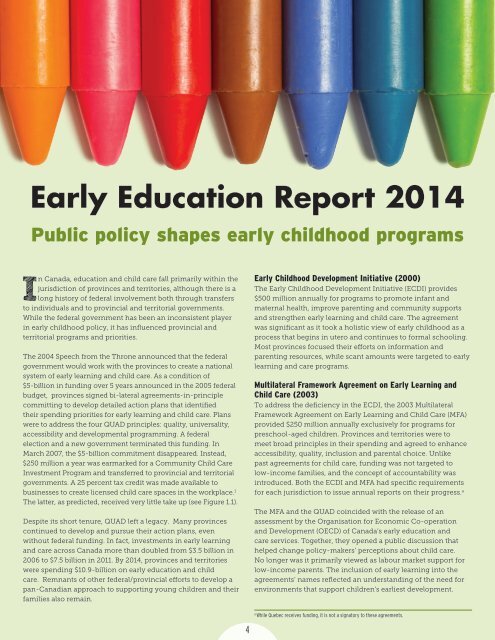early-childhood-education-report2014-eng
early-childhood-education-report2014-eng
early-childhood-education-report2014-eng
Create successful ePaper yourself
Turn your PDF publications into a flip-book with our unique Google optimized e-Paper software.
Early Education Report 2014<br />
Public policy shapes <strong>early</strong> <strong>childhood</strong> programs<br />
In Canada, <strong>education</strong> and child care fall primarily within the<br />
jurisdiction of provinces and territories, although there is a<br />
long history of federal involvement both through transfers<br />
to individuals and to provincial and territorial governments.<br />
While the federal government has been an inconsistent player<br />
in <strong>early</strong> <strong>childhood</strong> policy, it has influenced provincial and<br />
territorial programs and priorities.<br />
The 2004 Speech from the Throne announced that the federal<br />
government would work with the provinces to create a national<br />
system of <strong>early</strong> learning and child care. As a condition of<br />
$5-billion in funding over 5 years announced in the 2005 federal<br />
budget, provinces signed bi-lateral agreements-in-principle<br />
committing to develop detailed action plans that identified<br />
their spending priorities for <strong>early</strong> learning and child care. Plans<br />
were to address the four QUAD principles: quality, universality,<br />
accessibility and developmental programming. A federal<br />
election and a new government terminated this funding. In<br />
March 2007, the $5-billion commitment disappeared. Instead,<br />
$250 million a year was earmarked for a Community Child Care<br />
Investment Program and transferred to provincial and territorial<br />
governments. A 25 percent tax credit was made available to<br />
businesses to create licensed child care spaces in the workplace. 1<br />
The latter, as predicted, received very little take up (see Figure 1.1).<br />
Despite its short tenure, QUAD left a legacy. Many provinces<br />
continued to develop and pursue their action plans, even<br />
without federal funding. In fact, investments in <strong>early</strong> learning<br />
and care across Canada more than doubled from $3.5 billion in<br />
2006 to $7.5 billion in 2011. By 2014, provinces and territories<br />
were spending $10.9-billion on <strong>early</strong> <strong>education</strong> and child<br />
care. Remnants of other federal/provincial efforts to develop a<br />
pan-Canadian approach to supporting young children and their<br />
families also remain.<br />
Early Childhood Development Initiative (2000)<br />
The Early Childhood Development Initiative (ECDI) provides<br />
$500 million annually for programs to promote infant and<br />
maternal health, improve parenting and community supports<br />
and str<strong>eng</strong>then <strong>early</strong> learning and child care. The agreement<br />
was significant as it took a holistic view of <strong>early</strong> <strong>childhood</strong> as a<br />
process that begins in utero and continues to formal schooling.<br />
Most provinces focused their efforts on information and<br />
parenting resources, while scant amounts were targeted to <strong>early</strong><br />
learning and care programs.<br />
Multilateral Framework Agreement on Early Learning and<br />
Child Care (2003)<br />
To address the deficiency in the ECDI, the 2003 Multilateral<br />
Framework Agreement on Early Learning and Child Care (MFA)<br />
provided $250 million annually exclusively for programs for<br />
preschool-aged children. Provinces and territories were to<br />
meet broad principles in their spending and agreed to enhance<br />
accessibility, quality, inclusion and parental choice. Unlike<br />
past agreements for child care, funding was not targeted to<br />
low-income families, and the concept of accountability was<br />
introduced. Both the ECDI and MFA had specific requirements<br />
for each jurisdiction to issue annual reports on their progress. a<br />
The MFA and the QUAD coincided with the release of an<br />
assessment by the Organisation for Economic Co-operation<br />
and Development (OECD) of Canada’s <strong>early</strong> <strong>education</strong> and<br />
care services. Together, they opened a public discussion that<br />
helped change policy-makers’ perceptions about child care.<br />
No longer was it primarily viewed as labour market support for<br />
low-income parents. The inclusion of <strong>early</strong> learning into the<br />
agreements’ names reflected an understanding of the need for<br />
environments that support children’s earliest development.<br />
a<br />
While Quebec receives funding, it is not a signatory to these agreements.<br />
4


